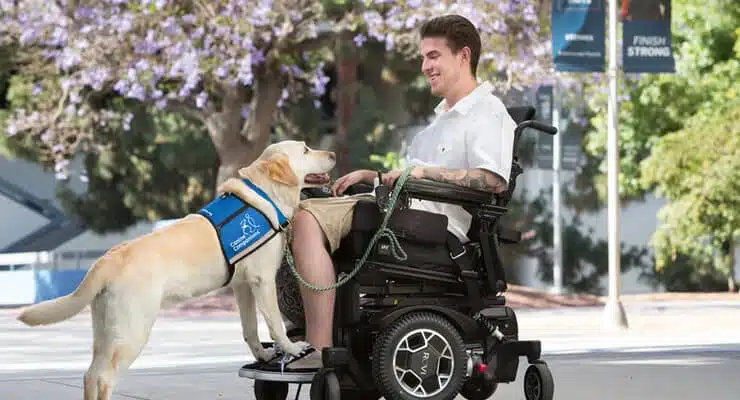Gyms, places of worship like mosques, synagogues, etc., and most swimming pools in Virginia Beach will generally not let service dogs in. These animals perform an important job for their handlers, but due to health and safety concerns that we’ll discuss in this article, certain places simply cannot let them in.
In this article, we’ll explain where service dogs are not allowed in general and why they get extra privileges under the Americans With Disabilities Act (ADA).
Why Service Dogs Get Extra Privileges
Service dogs go through intense, specialized training that they need in order to perform the critical jobs they’re given, and that’s most of the reason why they’re given extra privileges, too. Tasks that they perform usually include helping people with disabilities to live more independently and safely; without the help of another person. For example, guide dogs help visually impaired people simply navigate their surroundings.
The legal framework recognizes the importance of these dogs and the jobs they perform, and has made legislation in accordance. This legislation also makes a clear difference in the privileges of service dogs and those of ESAs and regular pets.
Under the Americans with Disabilities Act (ADA) in the United States, service dogs are recognized as working animals, not pets. The ADA grants them the right to accompany their handlers in public places.
This includes places where pets are typically not allowed, such as restaurants, hospitals, and even airplanes. This regulation is necessary to make sure that people with disabilities, whose daily lives may be hindered without the help of their service animal, can fully participate in everyday activities like everyone else.
A common question is that, since emotional support animals (ESAs) also help their handlers, why don’t they get the same privileges as service animals? ESAs do indeed perform an important job, which is providing comfort and emotional stability to their owners, but the important part is that they don’t require a service dog certification, which is what grants special privileges and legal protections to service dogs.
ESAs can help deal with symptoms of mental health issues such as depression and anxiety simply through their presence and companionship. However, they’re not trained to perform specific tasks that assist with a disability. Service animals, on the other hand, are trained to assist while also behaving in a non-disruptive, predictable, and reliable way no matter where they are.
That’s why ESAs don’t have the same privileges under the ADA, although they do get some rights under other laws, such as the Fair Housing Act, which allows them to live with their owners in housing that typically doesn’t allow pets.
Places Where These Privileges Don’t Apply
Service animals get a lot of privileges to be sure, but there are still certain places where access is not necessarily granted to them. Generally, this includes places where their presence could pose a direct threat to health or safety like operating rooms or certain sterile zones within hospitals.
This doesn’t mean that they’re not allowed in hospitals at all, just that they can’t go into the areas where contamination is a concern.
The law also specifies that places of worship are not required to allow service animals, though many do still choose to accommodate them out of courtesy and inclusivity. The same goes for private clubs and organizations that do not open their facilities to the general public.
They can set their own rules when it comes to service animals. Other places where a service dog might not get access include gyms and swimming pools in hotels or communities due to public health concerns.
Taking Your Dog Everywhere With You
People with service animals can take their dogs more or less anywhere with them, barring select areas that are often too exclusive to even let certain people in.
Service dogs are trained to behave well no matter where they are, but in places like operating rooms in hospitals, they pose a risk of contamination that the healthcare staff simply cannot take.
It’s important that you confirm in advance whether the hospital (or other exclusive location) is okay with you bringing your service dog with you, or if you need to make some other arrangement prior.

















